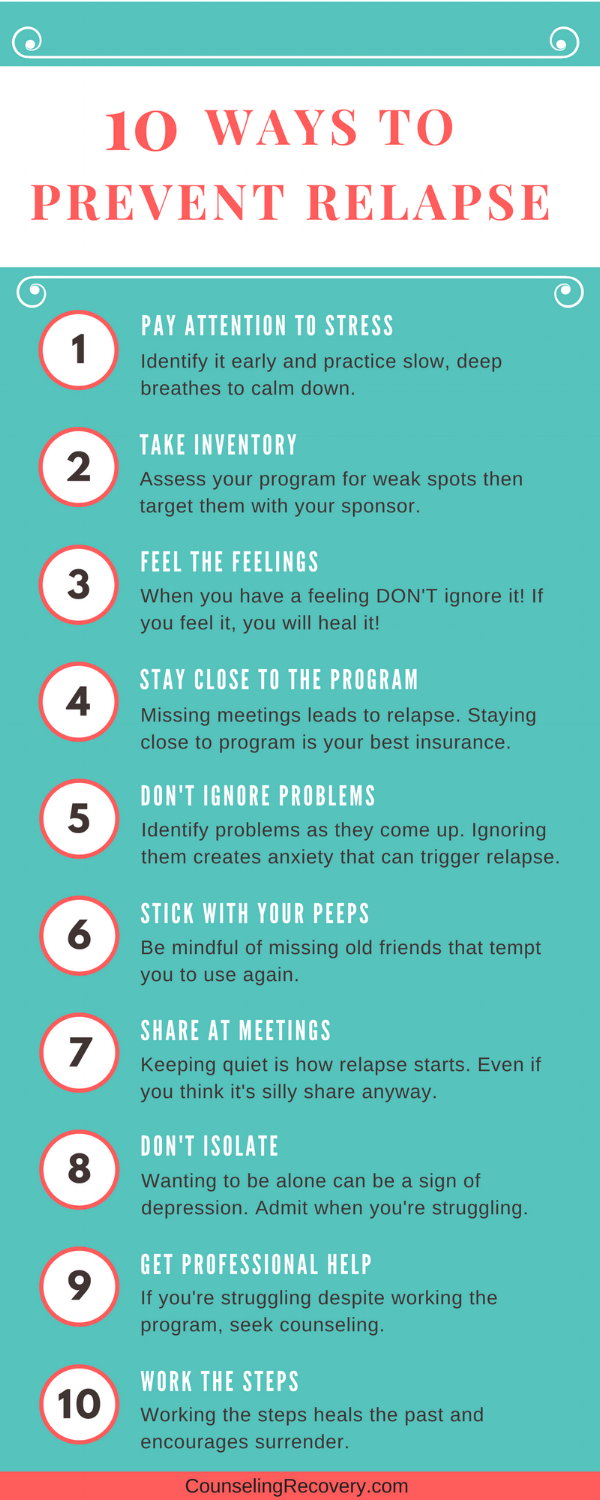10 Tips To Avoid Relapse In 12 Step Recovery
Whether you're in recovery from substance abuse, shopping, sex, or codependency, the process doesn't change.
Signs of relapse follow a predictable pattern that start weeks, even months beforehand so knowing what to look for can stop the cycle.
The statistics on relapse are sobering. According to the National Institute of Alcohol relapse rates vary from 40- 90% in the first year. These include addictions that range from alcohol and drugs to gambling, compulsive sex and food addiction.
Relapse doesn't mean failure. For many, relapse is a part of the recovery process but that doesn't mean you can't take steps to avoid it. There are ways to substantially decrease your chances by learning the warning signs now.
1. Pay Attention to Stress
Substances are often used to avoid stress and painful emotions. Learn to identify the signs of stress. Common warning signs include; rapid heart beat, sweating, muscle tension, irritability and clenched jaw. Use these signs to figure out what you need. Identifying stress early is the first step in managing it.
Find healthy alternatives to cope with stress. Incorporate physical activity to get the energy out of your body. Try a meditation practice to manage stress as its happening.
Tapping is an amazingly simple tool for calming down fast. Click here to learn more about tapping, an effective technique for reducing stress.
2. Take Inventory of Your Program
Even if you have never done a formal inventory, it's important to assess the strength of your program. Doing it yourself without the help of other members leads to relapse.
Here is a mini-check list to assess your recovery.
Do you have a sponsor that you trust and call regularly?
Have you found healthy meetings that focus on recovery?
Are you working the steps with your sponsor?
Are you doing service to contribute and become a part of the group?
Are you willing to share honestly at meetings?
3. Feel the Feelings
Addiction creates a destructive cycle of avoiding pain. In early recovery, feelings are more intense because you're not used to them yet.
A common recovery tip focuses on doing “90 meetings in 90 days” because when you start to feel your feelings, you need a safe place. Sharing at meetings helps the addict learn how to cope so you're not as tempted to use again.
4. Stay Close to the Program
When bad things happen, utilize your support system. Going to meetings consistently keeps you connected. Then, when a crisis hits you're not as likely to isolate.
Once you have your tribe, you'll be less likely to leave the program because you're not alone!
5. Don't Ignore Problems
Thinking that your problems will go away on their own is old behavior. Eventually the problem gets too big to handle without wanting to use. Practice confronting issues today so they don't increase tomorrow. Click here to read How 12 Step Slogans Can Help.
6. Stick with Your Peeps
The disease of addiction grows in isolation. At some point you might want to hang out with old friends that use. Thinking you can handle it is called “stinking thinking.”
Checking in with another member - especially a sponsor - can save you a relapse. Having that person to be accountable to keeps you honest.
7. Share at Meetings
This sounds obvious right? But how many times do you find yourself sharing inside your head but not in the meeting? That negative voice telling you "that's silly" stops you from being honest. Letting this self-talk control you makes you stop sharing altogether.
Then you're really alone.
8. Don't Isolate
Spending more time alone is a relapse warning sign. Isolating is a common sign of depression. Being in recovery means telling the truth no matter what looks like. Everyone in recovery struggles but admitting that you're hurting can be the start of healing. When you can share it, you start to heal it. No one is meant to recover alone.
9. When to Get Professional Help
Experiencing some depression and anxiety is normal in early recovery but when it impacts daily functioning, it's time to get professional help. If your ability to work, take care of yourself, or stay connected to family and friends starts to slide, consider getting help.
Individual counseling and therapy groups offer a safe place to work through the pain and move forward. Often times, local counseling agencies offer low cost counseling for those in need.
10. Work the Steps
While meetings make you feel more connected, the steps create the opportunity for inner transformation. Admitting powerlessness, learning how to surrender and taking an inventory may seem overwhelming but the benefits far out weigh the fear. Having a sponsor walk you through each step makes this process less scary.
Putting It All Together
There is nothing you need to conquer alone anymore. Staying connected to your support system makes dealing with sober life bearable.
Individual relapse triggers need to be addressed. Getting to know what works and what doesn't takes time. While your recovery is unique, remember that these principles have been helping people live in sober life for over eighty years!


